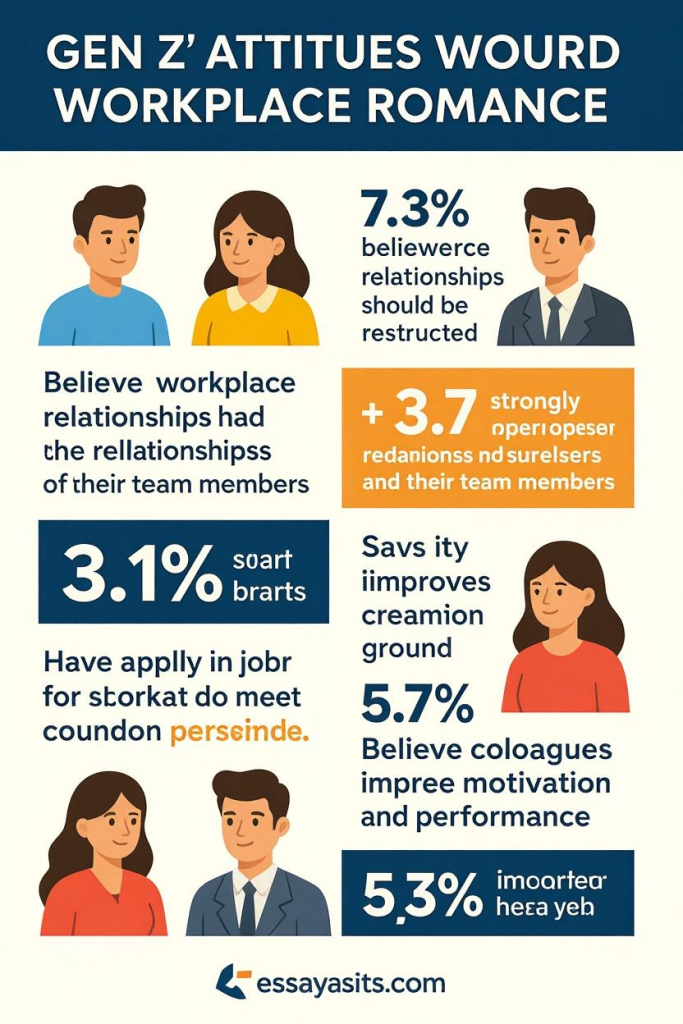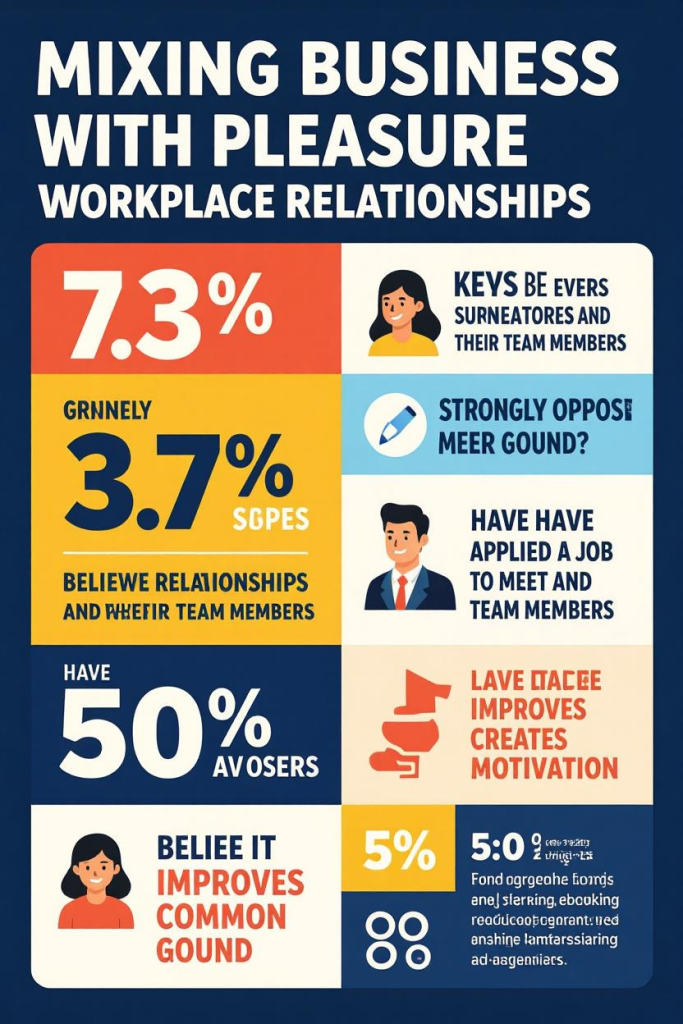
Gen Z’s Attitudes Towards Workplace Romance
Workplace romance has always been a headache for HR—blurring professional boundaries, breeding gossip, and occasionally creating conflicts of interest. Traditionally, companies discouraged it, if not outright banned it. But Gen Z, the most flexible and boundary-pushing generation in today’s workforce, isn’t one to blindly follow tradition.
Their approach to love at work is complicated: while many are cautious, others admit the office can feel like the perfect place to meet someone special. A recent Essayassits.com survey of 2,000 American Gen Zers reveals the nuances of their attitudes—and the surprising ways they balance professionalism with passion.
Key Takeaways

- 73% of Gen Zers believe workplace relationships should be restricted.
- 37% strongly oppose relationships between supervisors and their team members.
- 21% have applied for a job to meet someone special.
- 50% say dating colleagues creates common ground, while 40% believe it improves motivation and performance.
- 37% have dated a colleague, and 22% have kept it secret to avoid gossip.
- 70% avoid office dating due to fear of awkward breakups.
- 60% worry that return-to-office mandates could lead to an increase in cheating.
Mixing Business with Pleasure: Gen Z’s Rules for Workplace Relationships

Cautious About Power Dynamics
Gen Z is clear on one thing: romance and hierarchy don’t mix. In a recent survey, 37% of young workers said relationships between supervisors and their direct reports are off-limits. For them, it’s not just about professionalism but fairness—avoiding favoritism, conflicts of interest, and uncomfortable power imbalances.
Keep It Professional (Most of the Time)
While Gen Z embraces casual dress codes and open communication, many draw the line when it comes to love at work. 36% say romance has no place in business at all. They’d rather keep their career and their love life in separate lanes.
Yet, they’re not necessarily policing others. In fact, 77% say they don’t care if colleagues date, while only a small portion admit to feeling uncomfortable (16%) or jealous (7%) about it. The message is clear: do what you want, just don’t let it disrupt the team.
Employers Need Clear Rules
Here’s where things get messy: 55% of Gen Zers say workplace relationship policies at their jobs are vague or undefined. Without clear guidelines, young workers are left guessing at what’s acceptable—and worrying about crossing invisible lines. For a generation that values transparency, this uncertainty adds unnecessary stress.
The “Work Spouse” Dynamic
Gen Z has embraced the concept of the “work spouse”—a close colleague who feels like a partner during the 9-to-5. Half of Gen Zers say they’ve had one, enjoying the emotional support, shared gossip, and camaraderie. While most keep it platonic, some of these bonds evolve into real romance. About 7% admit their work spouse became a date, and 2% even tied the knot.
The Risks of Office Romance
Despite the occasional success story, most Gen Zers are wary of the potential fallout. 70% avoid dating colleagues to steer clear of awkward breakups, while 22% say they’ve hidden past relationships to avoid office gossip. And with the return-to-office trend, 60% worry that proximity could increase the chances of cheating scandals.
Can Employees Date Each Other? The Policy Problem
Workplace romance is a story as old as the office itself. Colleagues spend hours together, build trust, and sometimes—despite the HR handbook—find themselves crossing the line from professional to personal. But when love blooms at work, it raises an age-old question: can employees date each other, and what do company policies actually say?
Why Workplace Dating Is Tricky
From HR’s perspective, office romance is never just about feelings. It’s about risk management. Romantic relationships between employees can lead to:
- Favoritism and bias – especially when one partner holds authority over the other.
- Workplace tension – breakups often spill over into team dynamics.
- Legal and ethical risks – harassment claims, conflicts of interest, or perceptions of unfair treatment.
For employers, these aren’t small concerns—they can impact productivity, company culture, and even lawsuits.
Gen Z’s Take on Office Relationships
Interestingly, younger workers aren’t entirely against workplace romance. Surveys suggest:
- 36% believe love has no place in the office.
- 37% say manager-employee relationships should be strictly prohibited.
- Yet 21% have admitted to applying for a job to meet someone special.
For Gen Z, dating a peer feels more acceptable than dating a superior. But even then, many hide relationships to avoid gossip or HR’s scrutiny.
The Policy Gap
Here’s the problem: while some companies have clear rules about workplace relationships, 55% of young workers say their employer’s policies are unclear or undefined. This gray area creates confusion, forcing employees to guess whether their romance is crossing a line.
Some organizations take a hardline approach—completely banning intra-office relationships. Others adopt a disclosure policy, requiring employees to report the relationship to HR if it could create conflicts of interest. The challenge lies in balancing professional boundaries with personal freedom.
Is Love Worth the Risk?
For employees, the decision to pursue a workplace romance often comes down to weighing connection against consequences. For employers, the challenge is setting boundaries without overstepping into personal lives.
One thing is clear: policies need to evolve with the workforce. With younger generations valuing transparency and authenticity, it’s not enough to rely on vague rules or unspoken expectations. Companies that openly address workplace relationships—through clear, fair, and modern policies—can prevent drama before it starts.
So, can employees date each other? The answer is yes—but only with clear communication, mutual respect, and an employer that sets the boundaries upfront. Without that, both love and work are left vulnerable to complications.
Open to Work Love: The Office as a Dating Pool
For many, the workplace has always been a professional space first and foremost. But for Gen Z, who value authenticity, connection, and convenience, the office can sometimes double as something else: a dating pool. With return-to-office mandates on the rise, the question emerges—is the workplace the new place to find love?
More Than a Paycheck
For Gen Z, work isn’t just about climbing the career ladder—it’s also about building community. Surveys show that 21% of Gen Zers have applied for a job with the hope of meeting someone special. Some even admit to choosing industries or companies based on the type of people they might encounter.
The office becomes more than a paycheck; it’s a space where friendships, flirty encounters, and even long-term relationships can take root.
Common Ground Creates Chemistry
One reason workplace romances feel so natural is the built-in common ground. Sharing daily commutes, tackling projects together, or even just venting about deadlines provides plenty of opportunities for connection. In fact:
- 50% of Gen Zers believe dating coworkers offers easy conversation starters.
- 46% say commuting together makes relationships more convenient.
- 40% claim dating a colleague actually boosts motivation and performance.
For a generation that thrives on collaboration and shared experiences, it’s no surprise that romance often follows.
Return-to-Office = Return-to-Romance?
Remote work made dating a coworker nearly impossible. But with many employers pushing people back into offices, 34% of Gen Zers believe their chances of finding love at work will increase. For some, it’s almost like their company is playing matchmaker.
Of course, this convenience doesn’t come without risks. Office gossip, awkward breakups, and HR policies loom large over any potential romance. Still, for many young professionals, the chance to find love outweighs the risks.
Love on the Clock: A Balancing Act
For Gen Z, the preference is clear: let relationships happen naturally, but with mutual respect and boundaries in place.
The office may not be Tinder, but for Gen Z, it can still spark romance. Whether it’s bonding over projects or stealing glances during coffee breaks, the workplace remains one of the most organic environments to meet someone new. At the end of the day, love doesn’t clock out—it often just finds a way between the spreadsheets.
Breaking Hearts (and Company Policy)
Even with the risks, Gen Z is not immune to office romance: click on the link and get more at essayassits.com https://essayassists.com/wp-content/uploads/2025/09/narative.jpg
- 37% admit to dating a coworker.
- 22% confess they’ve kept it secret to avoid gossip or HR intervention.
- 82% of those who date stick to colleagues at their own level, but 12% have been involved with someone higher up the chain.
The “work spouse” dynamic is also common—50% say they’ve had one, though most stay platonic. Still, 7% say these bonds evolved into real dates, and 2% even led to marriage.
Swiping Left at Work: Why Gen Z Shies Away
For all the intrigue, the risks often outweigh the rewards.
- 70% avoid office dating out of fear of awkward breakups.
- 19% feel comfortable going public with a colleague relationship, while 22% intentionally hide it.
- 14% hide relationships specifically to avoid HR’s scrutiny.
The reality is simple: for most, office romance is more stress than it’s worth.
Not Safe for Work: The Darker Side
Unfortunately, not all workplace interactions are consensual or healthy.
- 33% of Gen Zers say they’ve faced unwanted attention from a boss.
- This includes flirty remarks (20%), suggestive comments (14%), and invasions of personal space (9%).
- 14% admit to being pressured to quit over jealousy or flirtations involving a partner at work.
- And with 60% fearing return-to-office mandates could fuel cheating, trust issues are another complication.
These findings highlight why workplace romance remains such a fraught subject: it can create opportunities for connection, but also for power imbalances and misconduct.
FAQs: Gen Z and Workplace Romance

1. Do Gen Zers support workplace relationships?
Not entirely. While many Gen Zers are open to casual workplaces, 73% believe office relationships should be restricted, especially between supervisors and employees.
2. How common are workplace romances among Gen Z?
Surprisingly common. About 37% of Gen Zers have dated a colleague, though many kept it a secret to avoid gossip or HR trouble.
3. Why do some Gen Zers avoid dating coworkers?
The top reason is fear of awkward breakups—70% worry about the fallout of sharing an office with an ex. Others cite risks of gossip, favoritism, and professional conflicts.
4. Do return-to-office mandates affect office romance?
Yes. With more employees back on-site, 34% of Gen Zers believe the chances of finding love at work increase. At the same time, 60% fear more in-office interactions could spark cheating.
5. What do Gen Zers think about dating a boss or supervisor?
They generally disapprove. 37% say supervisor-employee romances are inappropriate, but 22% admit to catching feelings for their boss anyway.
6. Why do some Gen Zers see the office as a dating pool?
For many, the workplace offers built-in common ground. 50% say dating colleagues provides easy conversation starters, and 40% believe it improves motivation and performance.
7. How do employers handle Gen Z’s views on romance at work?
Policies are often unclear. About 55% of Gen Zers say their employer’s stance on office dating isn’t well defined, leaving room for confusion and mixed signals.
8. Are workplace romances always negative?
Not necessarily. While they carry risks, workplace relationships can foster connection, motivation, and even long-term partnerships—though they also challenge HR to balance personal freedom with professionalism visit essayassits.com and get more.
Conclusion
Gen Z may be redefining the workplace with their love of flexibility and informality, but when it comes to romance, they’re cautious. They’re curious enough to give it a try, but realistic enough to fear the fallout.
For employers, this means it’s time to rethink outdated, one-size-fits-all romance policies. Transparency, clear boundaries, and respect for privacy will be key in navigating this complex issue.
After all, love will always find a way—even in the breakroom.
Would you like me to also create a short infographic-style summary (with percentages and quick facts) that you could drop at the end of the blog for social media sharing?
For Gen Z, workplace romance is not taboo—but it comes with strict boundaries. They value authenticity and human connection, yet they’re pragmatic enough to recognize the risks. Their rules? Keep it equal, keep it respectful, and above all, keep it from interfering with the work itself.
As employers revisit policies for a younger, more open-minded workforce, one thing is certain: Gen Z may not fully reject love at work, but they expect clarity, fairness, and professionalism when it happens.
Would you like me to make a short “Dos and Don’ts” list for Gen Z workplace romance (something punchy and easy to share on LinkedIn or Instagram)?
